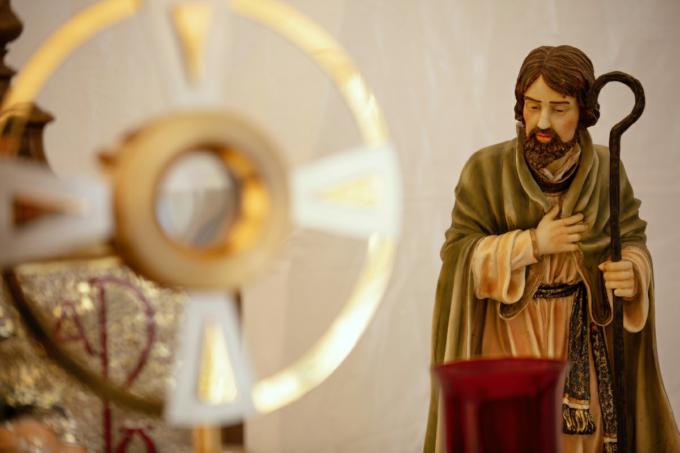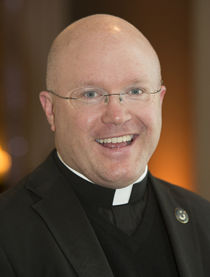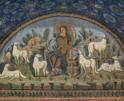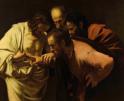
Faith
Consequently St. Joseph has been aptly referred to as the "Savior of the Savior." Blessed Pius IX, 150 years ago, placed the Church under St. Joseph's patronage so that he might similarly protect and defend the holy family Christ himself founded.

Landry
On December 8, to mark the 150th anniversary of St. Joseph being declared the patron of the universal church, Pope Francis decreed a Year of St. Joseph and published a beautiful apostolic letter entitled, "Patris corde," "With the Heart of a Father."
Ecclesiastical holy years are meant to influence everything the Church does. As we've seen over the course of the last 20 years -- during the Jubilee of Mercy, the Great Jubilee of Redemption, and the Years of the Rosary, the Eucharist, St. Paul, Priests, Faith, and the Consecrated Life -- the given theme provides special light to help us integrate and deepen our understanding and living of the faith as we relate each aspect of Catholic life to the theme of the year-long observance. The Year of St. Joseph is meant to have the same type of impact.
Hence, it's fitting, as we prepare to celebrate Christmas during this holy year, that we do so by entering "St. Joseph's School." There we can learn seven lessons about how he lived the first Christmas that can help us, according to our circumstances, live well this one.
The first lesson is about involvement. St. Joseph's participation was long willed by God, as we see in the genealogies of Jesus in St. Matthew and St. Luke, both of which run through St. Joseph. Just as Mary was part of God's advent through her Immaculate Conception, a singular grace given in view of her becoming the mother of the Son of God, so was Joseph part of God's remote preparation, so that Jesus would be a son of David through the law. While Joseph was a natural shoot from Jesse's tree, we have been "grafted" into that family tree (Rom 11:11-24), and we should be filled with Josephite wonder at how Jesus' nativity implicates each one of us.
The second lesson is about trusting, obedience to God. After the angel appeared to Joseph in a dream, he didn't hesitate to take Mary his wife into his home. He could have easily, even in a pre-Freudian age, deconstructed the dream according to the standard of his conscious desires and concerns, and continued confused about the genesis of the child Mary had miraculously conceived without male participation. Instead, Joseph awoke and did as God through his angel commanded. He did the same in response to three other dreams.
We might ask: Why didn't the angel come to Joseph right after the Annunciation to clue him in, or inform him at least the night before Mary's return from caring for Elizabeth and the newborn John the Baptist, so that he would not have had to endure the bewilderment, doubt, and scandal and would never have considered divorcing Mary? The likely reason is so that we could learn from him. Pope Benedict taught, "Throughout all of history, Joseph is the man who gives God the greatest display of trust, even in the face of such astonishing news."
For that reason, he is justly compared to Abraham. Just as Abraham left his native place, believed in God's power to give a child against the normal laws of nature, was willing to see the child sacrificed knowing that God could raise him again, and it was all "credited it to him as righteousness" (Gen 15:6, Rom 4:22) so Joseph, a "righteous man" (Mt 1:19), did the same. He is, like Abraham, a true "father in faith." If St. Elizabeth, filled with the Holy Spirit, could say of Mary "Blessed are you who believed that what the Lord had spoken to you would be fulfilled" (Lk 1:45), so we can all give the same praise to Joseph. His example of attentive, obedient faith invites us to trust completely in God and do promptly what he asks.
The third lesson is about prayerful silence in response to the mind-blowing mystery of God-with-us. St. Joseph never says a word in Sacred Scripture, although St. Matthew beautifully implies that he spoke once -- and said everything -- when he gave the newborn Son of God the Father and of Mary the name "Jesus." Everything in his life can be summed up by his speaking that one word, "God saves," for his entire existence became directed, as a hard-working "doer of the word" (Js 1:22), toward helping Jesus fulfill that saving mission.
His silence, however, speaks volumes. It shows that he was steeped in contemplation of the mystery of God, listening to the Word he was raising, adoring him and God's will enfleshed in him. He quietly worshipped Jesus and observed the loving adoration of Mary, the shepherds, angels, wise men, animals and angels. He continued to do so in Nazareth shrouded in the silence of the workshop and the home, as Jesus worked alongside him rebuilding the human race. In 2005, Pope Benedict prayed that in a cacophonous world that discourages recollection and attentive listening to God's voice, all of us would be "infected" with Joseph's prayerful silence.
The fourth lesson is about protection. Joseph was entrusted by God the Father as the "guardian," or we could say "bodyguard," of the Redeemer. We see the confidence of God the Father in Joseph's faith-filled capacity to give everything to protect Jesus in the fact that the Angel of God was sent to Joseph in a dream at the last second, summoning him immediately to arise, take the baby Jesus and Mary, and flee to Egypt, for Herod was seeking to assassinate the child. St. Peter Chrysologus commented that "though all Heaven was alarmed, and fear had spread there before it reached earth," God the Father didn't give Joseph even a day's notice about the impending danger. Upon hearing the message in a dream, Joseph didn't snooze until the morning. He arose, awakened Mary and Jesus, and leaving everything behind, began the trek on foot through the desert.
Consequently St. Joseph has been aptly referred to as the "Savior of the Savior." Blessed Pius IX, 150 years ago, placed the Church under St. Joseph's patronage so that he might similarly protect and defend the holy family Christ himself founded. Just as Joseph didn't disappoint God the Father's trust, neither will he disappoint the Church's. And he teaches us all how to guard Jesus and his Mother and all those in their image.
The fifth lesson is about providing. Joseph was resourceful enough to find lodging for Mary to give birth. He entrepreneurially found work in Bethlehem, Egypt and in Nazareth to support the Holy Family. St. Paul VI said that he "turned his human vocation to domestic love into a superhuman oblation of self," living what St. John Paul II called the "epitome of the Gospel of Work" as he provided for Jesus and Mary.
For this reason, the saints throughout the centuries have compared him to Joseph the Patriarch (Gen 37-50). They share the same name, the same receptivity to God's word through dreams, a similar chastity, and they know how to provide for God's family. Each was a "wise and faithful servant whom the Lord put in charge of his household (Lk 12:42). Pharaoh called Joseph the Patriarch the "Savior of the World" (Gen 41:45) for storing wheat for bread that sustained the world during seven years of famine. Joseph of Nazareth provided for the Living Bread who would be the world's true salvation. With confidence the Christian faithful has therefore never ceased to follow Pharaoh's advice to "go to Joseph."
The sixth lesson is about chastity. St. Joseph is invoked as Mary's "most chaste spouse," someone who reciprocates Mary's pure, white hot, spousal love and demonstrates, at a time when the sexual revolution has upended the meaning of love, marriage, sexuality and children, that true human love does not have to be carnally expressed. In "Patris corde," Pope Francis writes that the chastity of St. Joseph is "the summation of an attitude that is the opposite of possessiveness. Chastity is freedom from possessiveness in every sphere of one's life. Only when love is chaste is it truly love. . . . He never made himself the center of things. He did not think of himself but focused instead on the lives of Mary and Jesus." St. Joseph teaches us all how to love with similar unselfishness.
The last lesson is about growth. The name "Joseph" means "increase." His fatherhood was directly totally to helping Jesus grow according to his humanity, and Joseph wants to help Jesus grow in all of us. The sure path to making that happen is through growing in devotion to St. Joseph, since Joseph's whole life points to Jesus.
As we prepare to mark Christmas, we ask St. Joseph's intercession, to help us act on the angel's directive to "get up, take the child and his mother" (Mt 2:13), as faithfully, lovingly and wholeheartedly as he did.
- Father Roger J. Landry is a priest of the Diocese of Fall River, Massachusetts, who works for the Holy See's Permanent Observer Mission to the United Nations.
Recent articles in the Faith & Family section
-
Scripture Reflection for April 21, 2024, Fourth Sunday of EasterJem Sullivan
-
The new Temple: How Easter changes religionDr. R. Jared Staudt
-
The wonder of Ordinary TimeLucia A. Silecchia
-
Is there still responsibility for past sins after confession?Jenna Marie Cooper
-
Wounds, not scarsJaymie Stuart Wolfe


















